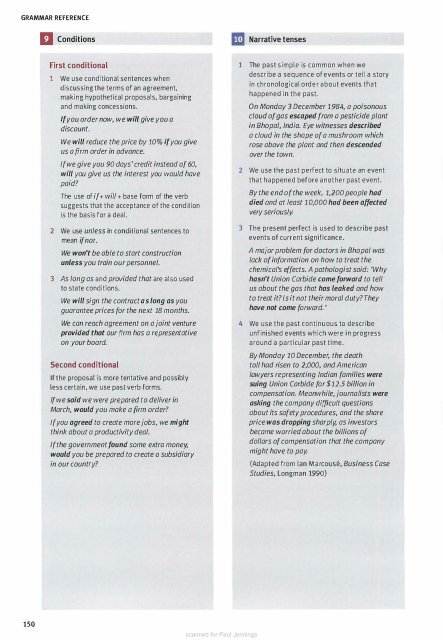Market+Leader+Intermediate+3rd+edition+SB
Market+Leader+Intermediate+3rd+edition+SB
Market+Leader+Intermediate+3rd+edition+SB
- No tags were found...
Create successful ePaper yourself
Turn your PDF publications into a flip-book with our unique Google optimized e-Paper software.
GRAMMAR REFERENCEII Conditions1m Narrative tensesFirst conditional1 We use conditional sentences whendiscussing the terms of an agreement,making hypothetical proposals, bargainingand making concessions.If you order now, we will give you adiscount.We will reduce the price by 10% if you giveus a firm order in advance.If we give you 90 days' credit instead of 60,will you give us the interest you would havepaid?The use of if + will + base form of the verbsuggests that the acceptance of the conditionis the basis for a deal.2 We use unless in conditional sentences tomean if not.We won't be able to start constructionunless you train our personnel.3 As long as and provided that are also usedto state conditions.We will sign the contract as long as youguarantee prices for the next 18 months.We can reach agreement an a joint ventureprovided that our firm has a representativeon your board.Second conditionalIf the proposal is more tentative and possiblyless certain, we use past verb forms.If we said we were prepared to deliver inMarch, would you make a firm order?If you agreed to create more jobs, we mightthink about a productivity deal.If the government found some extra money,would you be prepared to create a subsidiaryin our country?1 The past simple is common when wedescribe a sequence of events or tell a storyin chronological order about events thathappened in the past.On Monday 3 December 1984, a poisonouscloud of gas escaped from a pesticide plantin Bhopal, India. Eye witnesses describeda cloud in the shape of a mushroom whichrose above the plant and then descendedover the town.2 We use the past perfect to situate an eventthat happened before another past event.By the end of the week, 1,200 people hoddied and at least 10,000 hod been affectedvery seriously.3 The present perfect is used to describe pastevents of current significance.A major problem for doctors in Bhopal waslack of information on how to treat thechemical's effects. A pathologist said: 'Whyhasn't Union Carbide come forward to tellus about the gas that has leaked and howto treat it? Is it not their moral duty? Theyhave not come fo rward. '4 We use the past continuous to describeunfinished events which were in progressaround a particular past time.By Monday 10 December, the deathtoll had risen to 2,000, and Americanlawyers representing Indian families weresuing Union Carbide fo r $12.5 billion incompensation. Meanwhile, journalists wereasking the company difficult questionsabout its safety procedures, and the shareprice was dropping sharply, as investorsbecame worried about the billions ofdollars of compensation that the companymight have to pay.(Adapted from Ian Marcous


